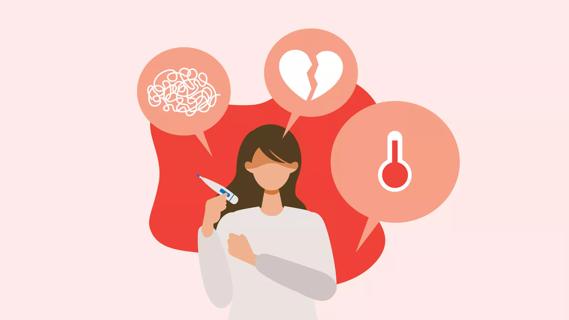Stress hormones trigger cravings in an attempt to keep us safe from danger

You’re probably well aware that stress can impact your food choices — that’s why we refer to certain dishes as “comfort foods,” right?
Advertisement
Cleveland Clinic is a non-profit academic medical center. Advertising on our site helps support our mission. We do not endorse non-Cleveland Clinic products or services. Policy
Whether you’re making your way through a breakup one spoonful of ice cream at a time, discussing problems at work with a hearty bowl of macaroni and cheese, or hitting the drive-thru on the way to visit a sick family member, “eating your feelings” is a common phenomenon when you’re under pressure.
Here’s the thing: It’s common because we’re designed that way. Humans evolved to crave sugary, fatty foods when under stress. When we turn to food for comfort, we’re responding to a hormonal trigger.
But what happens when the pressure triggering those hormones doesn’t let up — which, unfortunately, is the case for so many of us? Can long-term stress cause unhealthy weight gain?
Yes. Yes, it can.
We spoke to psychologist Leslie Heinberg, PhD, about the relationship between long-term stress and unhealthy weight gain — and how to combat these dual threats to our health.
If you want to understand the connection between stress and weight gain, you need to start by understanding what cortisol is and why it does what it does.
Cortisol is a hormone that your body releases when you’re feeling physical or psychological stress. Like adrenalin and norepinephrine, cortisol is a “fight-or-flight” hormone. These stress hormones slow down physiological processes that aren’t crucial to surviving an immediate threat — like your metabolism — and speed up the ones you need to survive in the moment.
Advertisement
In other words, when your cortisol level go up, it sets off a chain reaction. The hormone raises your blood pressure and insulin production, while simultaneously suppressing your immune system. As your insulin levels go up, your blood sugar drops, making you crave fatty, sugary foods.
Back when humans had to run away from wild animals and other serious environmental threats, a temporary increase in cortisol was a useful mechanism, Dr. Heinberg says. But today, stress is more long term.
And over time, that elevated cortisol can wreak havoc on our bodies.
A 2017 study showed a connection between the stress hormone cortisol and having overweight. It also found that higher cortisol levels are associated with carrying that extra poundage in the waist — what we sometimes refer to as visceral fat.
That study adds to an already strong association between long-term stress and unhealthy weight gain. A 2015 study found that our metabolism is slower when we’re stressed out, while a 2007 study found that high cortisol levels may actually enhance the feeling of satisfaction we experience when eating fatty, sugary foods.
It’s easy — and, frankly, natural — to gain weight during difficult moments in our lives. But that doesn’t mean that prolonged stress and weight gain are good for us.
Long-term overweight or obesity can negatively impact your health in many ways, for example:
The link between stress and weight gain is real. Those elevated cortisol levels circulating in your body lower your metabolism and encourage cravings for fat and sugars. And Dr. Heinberg notes that healthy habits, like getting enough sleep, exercising and eating a healthy diet, are harder to maintain when you feel like you’re maxed out emotionally.
It’s no surprise, then, that long-term stress can negatively impact your health. In addition to weight gain — and the complications that can come with it — long-term stress can also impact:
Advertisement
Dark as these clouds may be, there is a silver lining: A lot of the ways you can reduce your stress levels will also help you get or stay at a healthy weight (and vice versa).
While your brain may try to convince you otherwise, your health shouldn’t take a backseat during times of stress, Dr. Heinberg says.
“Things like exercise, meditation, mindfulness exercises, relaxation — those are ways that we can work toward good stress management, as well as good weight management,” she continues.
When we’re stressed out, adopting healthy habits can be even harder than usual. So, here are a few ways to combat stress that you can try today that don’t require you to change your lifestyle.
We eat for many reasons, only some of which have to do with hunger.
If you find yourself reflexively opening the fridge, take a beat and think about why you’re doing what you’re doing.
If the reason is, “I just really need to talk to some chocolate about this situation at work,” it’s probably best to walk away.
If that kind of self-control (or self-awareness) isn’t something you have at the moment, try setting a timer for 20 to 25 minutes when you first start craving that bag of potato chips or that sugary coffee drink. Then, forget about it and go do something else — preferably, something fun.
Advertisement
When that timer goes off, you may find that your craving is gone … because you weren’t actually hungry to begin with.
Have you noticed that you never read anymore? Are your dance moves getting rusty from underuse? Is your garden starting to look like a graveyard? Try setting a timer for however much time you can spare — even if that’s only 10 minutes — and do something that makes you happy. Investing in yourself always pays off, even if you’re short on time.
There’re so many good reasons to carve out a few minutes of your day for a walk. Here are a few of them:
Studies suggest that being out in nature is good for your mental health. But if the weather outside is frightful or you don’t feel safe walking alone, that’s OK. Walking in place, wherever you are, is a great alternative. If you want to make it even more effective, add some weights to the equation.
When the pressure is on, it’s easy to get fixated on the things you’ve done wrong. If you go on a food binge, miss an appointment, bounce a check or get a not-so-great grade on a test, resist the urge to engage in negative self-talk. Instead, focus on what you did — and are doing — right.
Advertisement
Being grateful is good for your health. It’s also one of the best ways to overcome a scarcity mindset. If you like writing things down, consider keeping a gratitude journal. If that’s not really your thing, there are plenty of other ways — small and large — to cultivate an attitude of gratitude.
Whether you’re working on your fitness, preparing for a job interview, attempting to actually keep a New Year’s resolution or just need to make it through a difficult day in one piece, setting SMART goals can help.
A SMART goal is:
You probably won’t be able to eliminate a source of chronic stress in a day, so don’t try. Instead, ask yourself what one or two things you can make happen today that will get you a step closer to that goal.
The “somebody” you talk to doesn’t need to be a therapist — though that’s a good idea, too. Talking to a friend, family member, colleague or partner may help you feel better. Just make sure you aren’t trauma dumping.
If you’re struggling with substance abuse, or are worried about your mental health, consider calling the Substance Abuse and Mental Health Administration’s national hotline. This confidential service provides referrals to local treatment facilities, support groups and community-based organizations for free.
Our impulse to eat more — and poorly — when we’re under stress is no accident. It’s an evolutionary adaptation that helped our species survive hostile environments and dangerous predators.
But these days, the “slings and arrows of outrageous fortune” Shakespeare wrote about aren’t actual slings and arrows: They’re full inboxes, empty bank accounts and an ever-growing pile of TPS reports.
Knowledge is power. And understanding why your body makes you crave sugar in times of stress is no exception to that rule. While it may not make the cravings for fat and sugar any less intense, understanding the connection between stress and weight gain may make it easier to make positive choices — or at least be kinder to yourself when you don’t.
Learn more about our editorial process.
Advertisement

Even small moments of time outdoors can help reduce stress, boost mood and restore a sense of calm

Fill your coping toolbelt with healthy skills like getting outside, writing in a journal, volunteering, laughing or talking with a friend

We all experience some stress from time to time, but chronic stress can contribute to health issues like diabetes and cardiovascular disease

Getting outside, eating a healthy diet, taking up journaling, listening to music — even cuddling a pet — can provide stress relief

Give these 30+ grocery items a try to help find relief

In response to stress or danger, your brain responds by either defending itself, running away, stopping or reconciling

From nausea, weight gain and eczema, stress can affect your immune system in many ways

From stomachaches and hives to sleepless nights and missed periods, stress can make an impact

Wearing a scarf, adjusting your outdoor activities and following your asthma treatment plan can help limit breathing problems

Your diet in the weeks, days and hours ahead of your race can power you to the finish line

When someone guilt trips you, they’re using emotionally manipulative behavior to try to get you to act a certain way